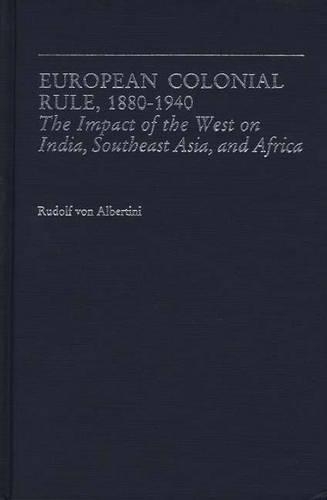
European Colonial Rule, 1880-1940: The Impact of the West on India, Southeast Asia, and Africa
(Hardback)
Publishing Details
European Colonial Rule, 1880-1940: The Impact of the West on India, Southeast Asia, and Africa
Bloomsbury Publishing PLC
Praeger Publishers Inc
20th December 1982
United States
Classifications
Tertiary Education
Non Fiction
909.09719
Physical Properties
Hardback
616
Width 156mm, Height 235mm
1077g
Reviews
[This] book deals with case studies of the effects of colonial rule on India, Burma, Ceylon, Malaya, Indonesia, Egypt, the Maghred, and Africa south of the Sahara between 1880 and 1940. Von Albertini emphasizes events and facts.... The result is a thesis that is very skeptical of the theoretically heavy but factually lightweight dependence school, which pictures colonial rule as the development of underdevelopment.' With precision and clarity Von Albertini reiterates an older, more commonsense judgment, stressing that underdevelopment is better than no development and that there is no reason to suppose that the Third World would be more developed without colonial rule than it now is. The translation ... is ... excellent, as are the maps and bibliography. College and university libraries.-Choice
"This book deals with case studies of the effects of colonial rule on India, Burma, Ceylon, Malaya, Indonesia, Egypt, the Maghred, and Africa south of the Sahara between 1880 and 1940. Von Albertini emphasizes events and facts.... The result is a thesis that is very skeptical of the theoretically heavy but factually lightweight dependence school, which pictures colonial rule as the development of underdevelopment.' With precision and clarity Von Albertini reiterates an older, more commonsense judgment, stressing that underdevelopment is better than no development and that there is no reason to suppose that the Third World would be more developed without colonial rule than it now is. The translation ... is ... excellent, as are the maps and bibliography. College and university libraries."-Choice
"[This] book deals with case studies of the effects of colonial rule on India, Burma, Ceylon, Malaya, Indonesia, Egypt, the Maghred, and Africa south of the Sahara between 1880 and 1940. Von Albertini emphasizes events and facts.... The result is a thesis that is very skeptical of the theoretically heavy but factually lightweight dependence school, which pictures colonial rule as the development of underdevelopment.' With precision and clarity Von Albertini reiterates an older, more commonsense judgment, stressing that underdevelopment is better than no development and that there is no reason to suppose that the Third World would be more developed without colonial rule than it now is. The translation ... is ... excellent, as are the maps and bibliography. College and university libraries."-Choice
Author Bio
n Albertini /f Rudolf /i with Albert Wirz
